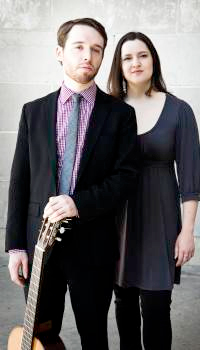by Timothy Robson

The two also presented an arresting new work by Caroline Shaw, which easily could have fit into a Pears/Bream recital program. Colin Davin closed the program with Britten’s only solo guitar work, Nocturnal after John Dowland, op. 70, composed for Julian Bream and first performed by him in 1964.
Under the title “Ancient Melodies, Modern Echoes,” Davin and Gomez alternated lute songs by Elizabethan composer John Dowland with songs from Britten’s cycle Songs from the Chinese, op. 58, which was written for Pears and Bream. Based on translations of ancient Chinese poetry, the songs, as pointed out by the Britten-Pears Foundation “cover familiar Britten themes of innocence, loss and regret.”
The Dowland songs (originally intended for lute accompaniment, but transferred skillfully here to guitar) In Darkness Let Me Dwell, If My Complaints Could Passions Move and All Ye, Whom Love or Fortune were given straightforward performances by Estilí Gomez, in a bright, pure and pitch-perfect voice. She was attentive to the texts and colored the words for just the right amount of emphasis, using straight tone and vibrato to enhance the music and meaning. Davin was a sensitive accompanist, paying close attention to the soprano’s breathing and phrasing. Both performed from memory, enhancing communication with the audience.
The six Britten songs were split into pairs (a practice Britten himself would not have countenanced). Although written for tenor voice, they transferred satisfactorily to soprano. The guitar part is virtuosic; Britten liked to challenge his performers with music just this side of unplayable. Colin Davin was up to the challenge, including harmonics, glissandi and other effects. Especially moving were the two more contemplative songs: “The Old Lute,” in which the poet muses on the instrument and its melodies no longer fashionable, and “Depression,” about age and decay, with its guitar and vocal glissandi creating an unearthly atmosphere. A rousing “Dance Song” about a unicorn closes the cycle.
Caroline Shaw (b. 1982) is active as both a violinist and vocalist on the New York new music scene, working with such luminaries as Roomful of Teeth, the Mark Morris Dance Group, Alarm Will Sound, Max Richter and Steve Reich. Her Partita for 8 Voices won the 2013 Pulitzer Prize. She was commissioned by Colin Davin and Estelí Gomez to compose Come Again (Again), which received its second performance and Cleveland premiere here. It is a deconstruction of one of the most famous Dowland songs, Come Again, Sweet Love Doth Now Invite.
According to the program notes, Shaw required an alternative guitar tuning for the work, and she also calls for the use of a “tonebar” slide to create similar glissandi as in Britten’s “Depression.” The first stanza of the song is sent conventionally for the voice, with a pointillistic accompaniment, seemingly random notes, but then fading into a more conventional harmonization. As the stanzas progress, the accompaniment becomes more obscure and deconstructed; eventually even Dowland’s own melody is dispensed with, replaced by one of Shaw’s devising, but set in the same meter and rhythm as Dowland.
The opening glissandi return at the end, finishing with the guitar playing Dowland’s melody, but without the final cadence, ending the piece inconclusively. Shaw’s debt to Britten’s Nocturnal – whether conscious or unconscious – was apparent, and having the two works closing the two parts of the concert was an intriguing parallel. Come Again (Again) deserves to enter the guitar repertoire.
The second half of the program opened with a straightforward performance of Dowland’s Come Again, without modern interpolations, followed by the final two Britten Chinese songs. Britten’s 15-minutes Nocturnal was the major work on this portion of the program. As in Shaw’s re-working of Come Again, Britten uses as his basis Dowland’s Come Heavy Sleep. Unlike Shaw, however, Britten begins his set of variations with the most remotely related to the original. Each succeeding variation comes closer to Dowland’s original, until, at the end of a passacaglia variation, the entire Dowland song is played.
In this performance Estelí Gomez sang the text with the guitar playing Britten’s setting from the solo work, with the last few measures of Nocturnal used as a coda. Although this decision added to the symmetry of the overall program, it was a miscalculation; the sudden introduction of the voice interrupted the austerity of Britten’s last guitar variation. But this is a small quibble in what was overall a highly imaginative and successful program.
Published on ClevelandClassical.com February 24, 2014
Click here for a printable version of this article.



